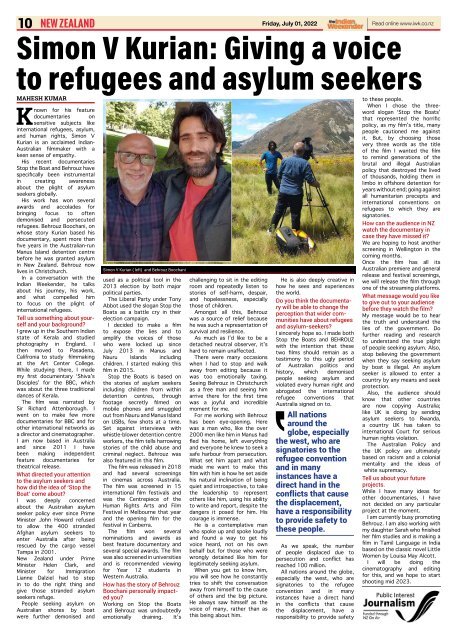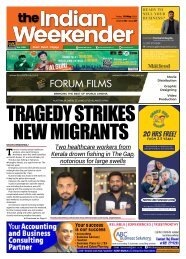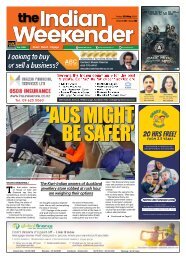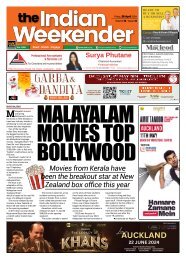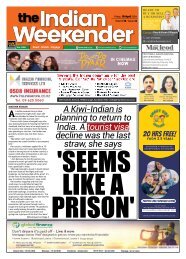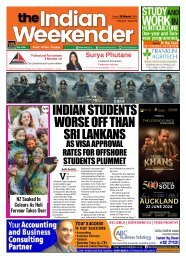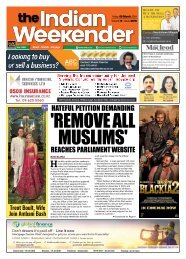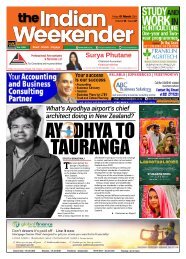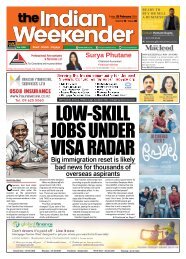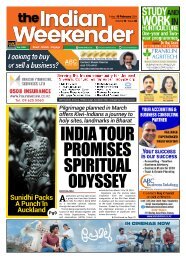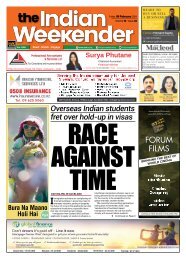Create successful ePaper yourself
Turn your PDF publications into a flip-book with our unique Google optimized e-Paper software.
10<br />
NEW ZEALAND<br />
Friday, <strong>July</strong> <strong>01</strong>, <strong>2022</strong><br />
Read online www.iwk.co.nz<br />
Simon V Kurian: Giving a voice<br />
to refugees and asylum seekers<br />
MAHESH KUMAR<br />
Known for his feature<br />
documentaries on<br />
sensitive subjects like<br />
international refugees, asylum,<br />
and human rights, Simon V<br />
Kurian is an acclaimed <strong>Indian</strong>-<br />
Australian filmmaker with a<br />
keen sense of empathy.<br />
His recent documentaries<br />
Stop the Boat and Behrouz have<br />
specifically been instrumental<br />
in creating awareness<br />
about the plight of asylum<br />
seekers globally.<br />
His work has won several<br />
awards and accolades for<br />
bringing focus to often<br />
demonised and persecuted<br />
refugees. Behrouz Boochani, on<br />
whose story Kurian based his<br />
documentary, spent more than<br />
five years in the Australian-run<br />
Manus Island detention centre<br />
before he was granted asylum<br />
in New Zealand. Behrouz now<br />
lives in Christchurch.<br />
In a conversation with the<br />
<strong>Indian</strong> <strong>Weekender</strong>, he talks<br />
about his journey, his work,<br />
and what compelled him<br />
to focus on the plight of<br />
international refugees.<br />
Tell us something about yourself<br />
and your background?<br />
I grew up in the Southern <strong>Indian</strong><br />
state of Kerala and studied<br />
photography in England. I<br />
then moved to Pasadena,<br />
Califronia to study filmmaking<br />
at the Art Center College.<br />
While studying there, I made<br />
my first documentary ‘Shiva’s<br />
Disciples’ for the BBC, which<br />
was about the three traditional<br />
dances of Kerala.<br />
<strong>The</strong> film was narrated by<br />
Sir Richard Attenborough. I<br />
went on to make few more<br />
documentaries for BBC and for<br />
other international networks as<br />
a director and cinematographer.<br />
I am now based in Australia<br />
and since 2<strong>01</strong>1 I have<br />
been making independent<br />
feature documentaries for<br />
theatrical release.<br />
What directed your attention<br />
to the asylum seekers and<br />
how did the idea of ‘Stop the<br />
Boat’ come about?<br />
I was deeply concerned<br />
about the Australian asylum<br />
seeker policy ever since Prime<br />
Minister John Howard refused<br />
to allow the 400 stranded<br />
Afghan asylum seekers to<br />
enter Australia after being<br />
rescued by the cargo vessel<br />
Tampa in 20<strong>01</strong>.<br />
New Zealand under Prime<br />
Minister Helen Clark, and<br />
Minister for Immigration<br />
Lianne Dalziel had to step<br />
in to do the right thing and<br />
give those stranded asylum<br />
seekers refuge.<br />
People seeking asylum on<br />
Australian shores by boat<br />
were further demonised and<br />
Simon V Kurian ( left) and Behrouz Boochani<br />
used as a political tool in the<br />
2<strong>01</strong>3 election by both major<br />
political parties.<br />
<strong>The</strong> Liberal Party under Tony<br />
Abbot used the slogan Stop the<br />
Boats as a battle cry in their<br />
election campaign.<br />
I decided to make a film<br />
to expose the lies and to<br />
amplify the voices of those<br />
who were locked up since<br />
<strong>July</strong> 2<strong>01</strong>3 in Manus and<br />
Nauru Islands including<br />
children. I started making this<br />
film in 2<strong>01</strong>5.<br />
Stop the Boats is based on<br />
the stories of asylum seekers<br />
including children from within<br />
detention centres, through<br />
footage secretly filmed on<br />
mobile phones and smuggled<br />
out from Nauru and Manus Island<br />
on USBs, few shots at a time.<br />
Set against interviews with<br />
whistle-blower detention centre<br />
workers, the film tells harrowing<br />
stories of the child abuse and<br />
criminal neglect. Behrouz was<br />
also featured in this film.<br />
<strong>The</strong> film was released in 2<strong>01</strong>8<br />
and had several screenings<br />
in cinemas across Australia.<br />
<strong>The</strong> film was screened in 15<br />
international film festivals and<br />
was the Centrepiece of the<br />
Human Rights Arts and Film<br />
Festival in Melbourne that year<br />
and the opening film for the<br />
festival in Canberra.<br />
<strong>The</strong> film won several<br />
nominations and awards as<br />
best feature documentary and<br />
several special awards. <strong>The</strong> film<br />
was also screened in universities<br />
and is recommended viewing<br />
for Year 12 students in<br />
Western Australia.<br />
How has the story of Behrouz<br />
Boochani personally impacted<br />
you?<br />
Working on Stop the Boats<br />
and Behrouz was undoubtedly<br />
emotionally draining. It’s<br />
challenging to sit in the editing<br />
room and repeatedly listen to<br />
stories of self-harm, despair,<br />
and hopelessness, especially<br />
those of children.<br />
Amongst all this, Behrouz<br />
was a source of relief because<br />
he was such a representation of<br />
survival and resilience.<br />
As much as I’d like to be a<br />
detached neutral observer, it’s<br />
hard to remain unaffected.<br />
<strong>The</strong>re were many occasions<br />
when I had to stop and walk<br />
away from editing because it<br />
was too emotionally taxing.<br />
Seeing Behrouz in Christchurch<br />
as a free man and seeing him<br />
arrive there for the first time<br />
was a joyful and incredible<br />
moment for me.<br />
For me working with Behrouz<br />
has been eye-opening. Here<br />
was a man who, like the over<br />
2000 men like him in Manus had<br />
fled his home, left everything<br />
and everyone he knew to seek a<br />
safe harbour from persecution.<br />
What set him apart and what<br />
made me want to make this<br />
film with him is how he set aside<br />
his natural inclination of being<br />
quiet and introspective, to take<br />
the leadership to represent<br />
others like him, using his ability<br />
to write and report, despite the<br />
dangers it posed for him. His<br />
courage is immense.<br />
He is a contemplative man<br />
who spoke up and spoke loudly<br />
and found a way to get his<br />
voice heard, not on his own<br />
behalf but for those who were<br />
wrongly detained like him for<br />
legitimately seeking asylum.<br />
When you get to know him,<br />
you will see how he constantly<br />
tries to shift the conversation<br />
away from himself to the cause<br />
of others and the big picture.<br />
He always saw himself as the<br />
voice of many, rather than as<br />
this being about him.<br />
He is also deeply creative in<br />
how he sees and experiences<br />
the world.<br />
Do you think the documentary<br />
will be able to change the<br />
perception that wider communities<br />
have about refugees<br />
and asylum-seekers?<br />
I sincerely hope so. I made both<br />
Stop the Boats and BEHROUZ<br />
with the intention that these<br />
two films should remain as a<br />
testimony to this ugly period<br />
of Australian politics and<br />
history, which demonised<br />
people seeking asylum and<br />
violated every human right and<br />
abrogated the international<br />
refugee conventions that<br />
Australia signed on to.<br />
All nations<br />
around the<br />
globe, especially<br />
the west, who are<br />
signatories to the<br />
refugee convention<br />
and in many<br />
instances have a<br />
direct hand in the<br />
conflicts that cause<br />
the displacement,<br />
have a responsibility<br />
to provide safety to<br />
these people.<br />
As we speak, the number<br />
of people displaced due to<br />
persecution and conflict has<br />
reached 100 million.<br />
All nations around the globe,<br />
especially the west, who are<br />
signatories to the refugee<br />
convention and in many<br />
instances have a direct hand<br />
in the conflicts that cause<br />
the displacement, have a<br />
responsibility to provide safety<br />
to these people.<br />
When I chose the threeword<br />
slogan ‘Stop the Boats’<br />
that represented the horrific<br />
policy, as my film’s title, many<br />
people cautioned me against<br />
it. But, by choosing those<br />
very three words as the title<br />
of the film I wanted the film<br />
to remind generations of the<br />
brutal and illegal Australian<br />
policy that destroyed the lived<br />
of thousands, holding them in<br />
limbo in offshore detention for<br />
years without end; going against<br />
all humanitarian precepts and<br />
international conventions on<br />
refugees to which they are<br />
signatories.<br />
How can the audience in NZ<br />
watch the documentary in<br />
case they have missed it?<br />
We are hoping to host another<br />
screening in Wellington in the<br />
coming months.<br />
Once the film has all its<br />
Australian premiere and general<br />
release and festival screenings,<br />
we will release the film through<br />
one of the streaming platforms.<br />
What message would you like<br />
to give out to your audience<br />
before they watch the film?<br />
My message would be to hear<br />
the truth and understand the<br />
lies of the government. Do<br />
further reading and research<br />
to understand the true plight<br />
of people seeking asylum. Also,<br />
stop believing the government<br />
when they say seeking asylum<br />
by boat is illegal. An asylum<br />
seeker is allowed to enter a<br />
country by any means and seek<br />
protection.<br />
Also, the audience should<br />
know that other countries<br />
are now copying Australia;<br />
like UK is doing by sending<br />
asylum seekers to Rwanda,<br />
a country UK has taken to<br />
international Court for serious<br />
human rights violation.<br />
<strong>The</strong> Australian Policy and<br />
the UK policy are ultimately<br />
based on racism and a colonial<br />
mentality and the ideas of<br />
white supremacy.<br />
Tell us about your future<br />
projects.<br />
While I have many ideas for<br />
other documentaries, I have<br />
not decided on any particular<br />
project at the moment.<br />
I am currently busy promoting<br />
Behrouz. I am also working with<br />
my daughter Sarah who finished<br />
her film studies and is making a<br />
film in Tamil Language in India<br />
based on the classic novel Little<br />
Women by Louisa May Alcott.<br />
I will be doing the<br />
cinematography and editing<br />
for this, and we hope to start<br />
shooting mid 2023.


